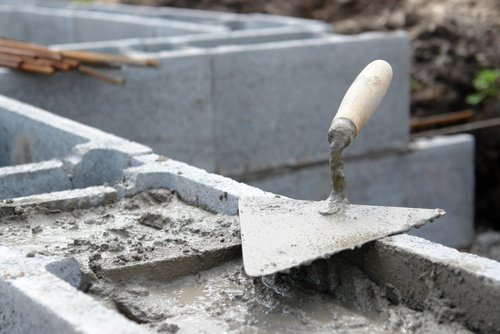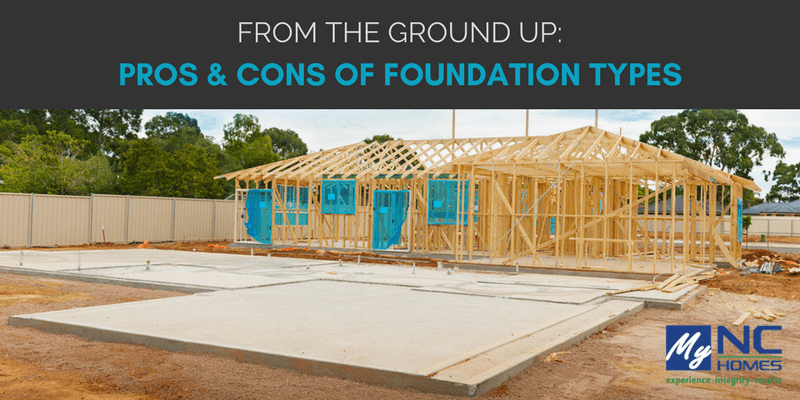Types Of Foundations
When it comes to building a new home, it all starts with a solid foundation. Most people take their homes’ foundation for granted, especially if they come from another part of the country. People from the Midwest are used to having a basement, while people in Florida are accustomed to having homes built on a slab.
But for people who relocate to the Triangle, or even those who have been here awhile, thinking about the different kinds of foundations is likely unfamiliar territory, because all kinds can be found here. Understanding the different kinds of foundations, and the pros and cons of each, is important for anyone considering buying a home here.
There are three basic kinds of foundation, each with its pros and cons:
1. Homes with Basements
The only time a home in this area has a basement is when it’s built on a sloped lot and the builder has no choice. One side of the basement (usually the back of the home) will be a walk-out, while the opposite side is below grade.
Pros: Walk-out basements offer additional living space that can be used for a rec room, additional bedrooms, or storage. Their convenient access to the back yard can be a nice feature.
Cons: In this area, basements are prone to problems associated with moisture - mold, water damage, buckling walls. Basement walls can be waterproofed, but this is not always done correctly, and on older homes may not have been done at all.
Verdict: If you’re considering a home with a basement, proceed with caution, as the potential problems may outweigh the benefits.
2. Slab on Grade Foundations
A slab foundation is the easiest for contractors to build. It’s basically just four to six inches of concrete poured over a leveled, compacted piece of ground.
Pros: Slabs allow the entry to be at grade level, or slightly above, eliminating the need for steps or ramps. It’s also the least expensive foundation to build.
Cons: Plumbing and other pipes are sealed into the concrete. If leaks or other problems occur, or if you want to remodel, accessing pipes will be difficult and expensive. Slabs are also subject to moisture problems if they aren’t waterproofed well.
Verdict: Unless grade-level access to the home is important, we do not recommend homes with slab foundations.
3. Homes with a Crawlspace
Homes with crawlspaces are the most common in the Triangle. This involves building a concrete or brick footing that sits about 30 inches above grade. They will include a vapor barrier and insulation below the ground floor, depending on if it’s a  sealed or ventilated crawlspace.
sealed or ventilated crawlspace.
Pros: Crawlspaces offer greater energy efficiency and permit easier access to mechanicals for repairs or renovations. Ventilated crawlspaces can also offer some storage space, depending on the height
Cons: The house is built at least a couple feet above grade, making steps or ramps necessary. For ventilated crawlspaces, care must be taken to close them off in the winter to prevent freezing pipes.
Verdict: If steps or ramps are not a concern, we believe crawlspaces are the best foundation type for this area.
For more information about foundations and buying and selling homes in the Triangle, or just general questions about buying a new-contructon home, contact My NC Homes today online or by phone at 919.659.5173.
Posted by Larry Tollen on

My husband and I are in the process of having our new house designed, and one of the things we need to look at is what kind of foundation we would like to have. I like how you pointed out that when it comes to choosing a basement foundation is that it will provide a lot of extra space that our family may need. It will be great to have more bedrooms for the kids, and a rec room for them to hang out in.
Posted by Alex Dean on Friday, June 16th, 2017 at 2:42pmAlex: Basements do offer extra space, however they also cost considerably more than stick frame building and can be problematic depending on the soils in the area you're building. If you're building in an area where the soils have a high clay content and annual rainfall exceeds 20" a year (for example here in the Raleigh-Durham-Chapel Hill area where I'm located) if you're going to have a basement put in you really need to make certain that the below grade walls are water proofed and that good foundation drainage is installed, otherwise 10 years down the road there's a very high probability that you will be dealing with moisture related issues in your basement. If you are building in our area and would like to chat further, feel free to give us a call. Thanks for taking the time to read our article and leave a comment.
My brother wants to build a home from the ground up, and I suggested he take careful considering with the foundation for this. Your article had great information regarding this, and I liked how you said to consider a slab foundation, as this is the easiest and least expensive foundation to build, and eliminates the need for stairs. Thanks; I'll share this with my brother to help him considering the foundation for his home.
Posted by Jocelyn McDonald on Thursday, February 14th, 2019 at 9:18amJocelyn,
Glad you found the article useful. - The My NC Homes Team
I love the idea of how a basement can be a walkout basement to the backyard, as you said. My husband and I have always dreamed of building our own home, and we're getting so close to achieving that goal! It would be nice to have a basement like this in our floorplans. I'll need to look for a concrete contractor to ask about this and see if it is possible to do this on our property.
Posted by Kate Welling on Tuesday, March 5th, 2019 at 6:01pmKate- Thank you for taking the time to leave a comment, glad you found the article helpful. - The My NC Homes Team
It really helped when you said that slabs are the least expensive foundation to build. My wife and I are building a new home next year and we are anxious to choose a good foundation for it. We'll keep trying to figure it out and find a structural engineer to work with.
Posted by Taylor Wright on Friday, December 20th, 2019 at 10:51amTaylor, glad you found the article helpful and thank you for taking the time to leave a comment. Slabs are great if you are looking to limit stairs but in my opinion aren't the best foundation type overall for a variety of reasons. They tend to crack over time as the ground shifts beneath them. They should be waterproofed and insulated and it's extremely rare when I see this done. If a pipe were to break and need repair, the only approach is through your interior floors. They definitely serve a lot of folks needs but when possible I suggest really learning about the local soils and ground conditions before selecting what type of foundation would work best. Good luck to you and your wife. Larry @My NC Homes
It's good to know that slab foundations are the least expensive and most easily accessible. My partner uses a wheelchair, so it's important to us that our new house is easy for him to access. While speaking with local builders later this year, I will be sure to ask about a slab on grade foundation. Lyla, Glad you found the information helpful. Really appreciate your taking the time to leave a comment Larry@ My NC Homes
Posted by Lyla Peterson on Tuesday, February 18th, 2020 at 10:51amI thought it was interesting when you explained that crawl spaces are more energy efficient because the foundation of the home is made out of concrete. If I were to guess, there are probably different mixtures of concrete that are used depending on the structure type. It would be interesting to learn more about what kind of mixture is used for residential homes. Henry that's a great question, though a bit out of my league. Glad you found the article interesting, we appreciate your taking the time to leave a comment. Larry@ My NC Homes
Posted by Henry Killingsworth on Thursday, February 20th, 2020 at 1:13pmI definitely agree that houses with basements are the ones that are more prone to moisture that can cause foundation problems. We tried to clean and organize our basement last week and also noticed that there are minor cracks around the area. I'll try to hire professionals in foundation repair services who can help me solve the problem.
Posted by Zoe Campos on Wednesday, September 9th, 2020 at 2:00amZoe, glad to hear you found the article helpful. Definitely have a professional evaluate the cracks you noticed. Typically anything under a 1/4" in width can be very easily addressed, without the need for more costly structural stabilization. Larry@My NC Homes
It's great that a basement can be used for things like storage or a recreational space. My spouse and I enjoy hosting family members whenever they come to town. Because of this, we may want to consider a basement with extra bedrooms and a home theater when we build our next house.
Posted by Anna Davis on Tuesday, November 24th, 2020 at 1:18pmAnna, Thanks for taking the time to leave a comment. Glad to hear our Blog gave you something to think about. As we note in the article, basements are a great as long as there aren't any underlying issues with the soils and or water. Some extra bedrooms for guests and a home theater sound great! Andrew @ My NC Homes
I live in a home on a crawlspace. I do wish building standards would require that crawlspaces be properly sealed with moisture mitigation and ventilation built in. While I do not have water in my crawlspace, the humidity and moisture level is so high, the insulation is absorbing it and it is beginning to hang from the floor. There are companies who can resolve this, but it is an $8-9k project. Builders could include this in construction at a lower cost. Gary, I hear you, I don't know how large your crawlspace is, but this sounds a little high. I hope you're able to find someone to do it for a more reasonable price. Andrew @ My NC Homes
Posted by Gary Lee on Tuesday, January 26th, 2021 at 11:10amLeave A Comment